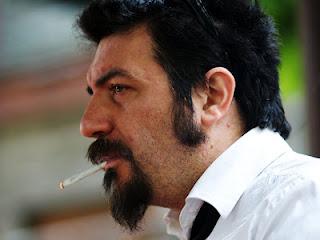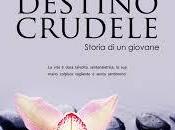In primo luogo abbiamo chiesto ad Arsenio come è nato il suo libro “Piccolo bastardo racconta“. Si tratta di una serie di racconti, esposti con la voce di un bambino di nove anni. Arsenio ha anche aggiunto, alla fine del libro, un frammento di inizio romanzo che aveva scritto a 12 anni. Per quel che concerne la poesia, tutte le sue creazioni sono disponibili su Lulu.com, in un volume di circa 800 pagine.
Abbiamo chiesto che cosa è un poetry slam: fondamentalmente è una gara fra poeti, circa 8 per ogni serata, che si incontrano e scontrano su un palco, leggendo poesie. C'è una giuria popolare che dà i voti e un Master of Cerimonies che modera le attività. Spesso ci sono anche dei musicisti per rendere l'esperienza “meno noiosa”. I più bravi vanno avanti, e a fine serata si proclama un vincitore.
 Da questo meccanismo è nato quindi il progetto “Poeti in lizza“, un torneo di poetry slam organizzato da Arsenio insieme a Guido Catalano ed Alessandra Racca, altri due poeti torinesi. Insieme avevano fatto molti poetry slam, alcuni belli e altri meno, specialmente dal punto di vista dell'organizzazione. Per questo motivo si sono proposti di creare un evento fatto bene, divertente e spettacolare, chiamando poeti molto bravi a partecipare. Per 32 posti disponibili si sono presentati in 80, e l'evento ha avuto un grande successo.
Da questo meccanismo è nato quindi il progetto “Poeti in lizza“, un torneo di poetry slam organizzato da Arsenio insieme a Guido Catalano ed Alessandra Racca, altri due poeti torinesi. Insieme avevano fatto molti poetry slam, alcuni belli e altri meno, specialmente dal punto di vista dell'organizzazione. Per questo motivo si sono proposti di creare un evento fatto bene, divertente e spettacolare, chiamando poeti molto bravi a partecipare. Per 32 posti disponibili si sono presentati in 80, e l'evento ha avuto un grande successo.Talmente grande che poi hanno proseguito con “Storie in lizza“, un altro evento che funzionava con gli stessi meccanismi di partecipazione e votazione del poetry slam, solo che invece di far scontrare poeti, hanno fatto scontrare storyteller. 5 minuti a testa, senza leggere: un'esperienza molto interessante, che ha portato Arsenio a concludere che è molto più difficile trovare dei bravi raccontatori che dei bravi poeti.
Un'altra domanda che abbiamo posto riguardava la situazione dell'editoria italiana al momento: negli Stati Uniti giornali e libri sono già dati per morti, e secondo Arsenio è solo questione di tempo finché anche in Italia si arriverà alla stessa conclusione. E' inevitabile, a suo avviso, che il libro diventi un prodotto di nicchia. La versione cartacea, tuttavia, rimarrà un oggetto quasi “da collezione”, per gli appassionati, mentre la fruizione di larga scala avverrà con i formati in digitale.
Faceva inoltre l'esempio di un scrittrice americana che ha scritto 40 romanzi e non è mai riuscita a pubblicarli attraverso gli editori. Ora invece è finalmente riuscita a pubblicare grazie ad Amazon: tolto il filtro, sarà il pubblico a decidere della qualità dei contenuti prodotti.
Un altro aspetto che abbiamo affrontato è stato quello del prezzo degli ebook. Secondo Arsenio non si può far pagare un ebook quanto un libro cartaceo, perché la percezione del valore è molto diversa. Un libro è un oggetto che esiste di per sé, e per produrlo bisogna sostenere delle spese per la stampa, la rilegatura, il trasporto; l'ebook, dall'altra parte, è un file su un HD, il costo di produzione è identico per una o mille copie.
In conclusione, Arsenio afferma che gli editori non scompariranno, ma che dovranno cambiare radicalmente il loro mestiere, per diventare un vero e proprio servizio agli autori. Scrivere un libro può essere un'attività solitaria, ma per la pubblicazione sono necessari molti passaggi tecnici e burocratici di cui gli editori potrebbero farsi carico. D'altronde, più cose ci sono da leggere, secondo lui, e meglio è: più gente scrive e migliore è un paese.
Vi invito naturalmente a visionare l'intervista integrale, ben più ricca di contenuti di questa mia breve sintesi.
Buona visione!
Maria Petrescu
Intervistato.com | Arsenio Bravuomo
Some time ago we had the pleasure of interviewing Arsenio Bravuomo, writer and poet who was written several poetry and short story books.
First of all we asked Arsenio how his book "Piccolo bastardo racconta" was born. It is a series of short stories, told with the voice of a nine year old boy. Arsenio has also added, at the end of the book, a fragment of the beginning of a novel he wrote when he was 12. As for poetry, all of his writings are available on Lulu.com, in a 800 pages volume.
We asked what a poetry slam is: it's a contest among poets, about 8 for each night, who challenge each other on stage, reading poetry. There's a jury who gives the votes and an MC who moderates activities. There are often musicians, in order to make the night "less boring". The best ones go forward, and at the end of the night a winner is proclaimed.
From this mechanism the project "Poets in lists", a poetry slam tourney organized by Arsenio together with Guido Catalano and Alessandra Racca, other two poets from Turin. Together they had done many poetry slams, some good and some bad, especially from an organizing point of view. For this reason they wanted to create a well designed event, funny and spectacular, calling very good poets to participate. 80 people had proposed to enter, for the 32 available spots, and the event itself has been a great success.
So great that they continued with "Stories in lists", another event that worked with the same participating and voting mechanisms as the poetry slam, but instead of having competing poets, they had competing storytellers. 5 minutes each, without reading: a very interesting experience, that has brought Arsenio to conclude that it is much more difficult to find good storytellers than it is to find good poets.
Another question we asked was about the situation of Italian publishing at the moment: in the US newspapers and books are already considered dead, and Arsenio thinks it is only a matter of time until Italy comes to the same conclusion. It is inevitable, in his opinion, that the book will become a niche product. The paper version will remain a collectable item for those who really enjoy the experience, while the large scale fruition will happen in a digital environment.
He also made the example of an American writer who wrote about 40 novels and has never been able to publish any of them through regular editors. She finally managed to publish them thanks to Amazon: once you eliminate the filter, the public will decide on the quality of the produced content.
Another aspect we discussed was the price of ebooks. Arsenio thinks it's not right to charge the same price for ebooks and paper books, because the perception of value is very different. The physical book is an objects that exists per se, and to produce it you must spend money on the printing, the binding, the transportation; an ebook, on the other side, is a file on a HD, and the production costs are the same for one copy or a thousand.
In conclusion, Arsenio says that editors won't disappear, but that they will have to change the type of job they do, to become a true service to authors. Writing a book might be a solitary activity, but for publishing you need a lot of technicalities and bureaucracy, which might be what editors could do. The more stuff there is to read, in Arsenio's opinion, the better: the more people write, the better the country.
I invite you to view the full interview, much richer in content than my brief synthesis.
Enjoy!
Maria Petrescu






